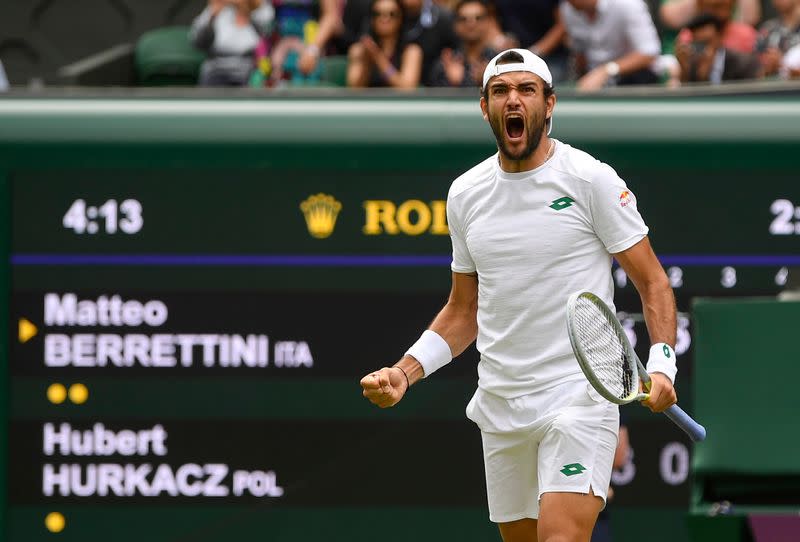Tennis-Berrettini seals Wimbledon final berth with Hurkacz win

LONDON (Reuters) - Seventh seed Matteo Berrettini stayed solid in the face of a spirited fightback from Poland's Hubert Hurkacz to become the first Italian to reach the Wimbledon final on Friday with a 6-3 6-0 6-7(3) 6-4 victory.
The 25-year-old took two hours and 36 minutes to get past the 14th seeded Hurkacz on Centre Court to reach the championship match on Sunday - the same day Italy play in the Euro 2020 soccer final a few miles up the road at Wembley Stadium against England.
Waiting for Berrettini on the opposite side of the net will be either world number one Novak Djokovic, a five-time Wimbledon winner, or Canadian 10th seed Denis Shapovalov.
"I have no words," Berrettini said in his on-court interview. "I need, I think, couple of hours to understand what happened. I just know that I played a great match. I'm really happy. I'm really glad to be here.
"I think I never dreamed about this because it was too much for a dream."
Berrettini's success in the past fortnight has not been entirely out of the blue as he arrived at the All England Club after winning his fifth tour-level title at Queen's.
He was the first player to win the Wimbledon warm-up event on his debut appearance since Boris Becker in 1985 and remains on course to match the German's feat of completing the Queen's Club-Wimbledon double in the same year.
Friday's victory also made Berrettini the first Italian man to reach a Grand Slam final since Adriano Panatta won the Roland Garros title in 1976.
It was billed as a tight contest between the first-time Wimbledon semi-finalists, who were evenly matched in their ability to serve big and came into the match with a 1-1 head-to-head record.
While Berrettini defeated Hurkacz in straight sets in the Australian Open qualifying draw in 2018, the Pole had returned the favour when they met the following year in Miami.
And following Hurkacz's morale-boosting quarter-final win over eight-time Wimbledon champion Roger Federer in straight sets, including a bagel in the third, few would have doubted his credentials against Berrettini.
But it was the Italian who got off to a crisp start and then dominated the contest, blasting 60 winners, including 22 aces.
EARLY WARNING
In the opening set, Berrettini set up three breakpoints in the third game but Hurkacz dished out couple of strong volleys under pressure to win five straight points and hold serve.
The early warnings had, however, been sounded.
Berrettini saved his first breakpoint with a big serve to hold for 3-3 and then went on to win 10 more games on the run, leaving Hurkacz stunned.
Hurkacz looked like a rabbit in the headlights and kept admonishing himself in frustration but failed to find solutions against the Italian's big serves, fast-dropping backhand slices and crunching forehands.
The capacity Centre Court crowd did their best to encourage Hurkacz to put up a fight hoping to extend the match and watch some more tennis.
The Pole responded.
After a lengthy comfort break Hurkacz returned with a spring in his step for the third set and did not face a single breakpoint on serve to take it to the tiebreak.
Berrettini, who looked solid despite his opponent's spirited fightback, made some nervous errors in the tie-break, netting a simple volley to let Hurkacz back into the contest.
But the Italian managed to hit the reset button immediately.
After a change of clothes during the break between sets he returned to court to break Hurkacz straight away and then consolidated his advantage for a 2-0 lead.
That lone break proved to be enough as the Italian continued to serve strongly and he sealed the contest when Hurkacz hit a return into the net on second matchpoint.
"I am trying to be the best at everything, but after the third set I was feeling I deserved to win it but lost it," Berrettini said.
"I said, 'it doesn't matter'. I was feeling the stronger player and that's what I said to myself, and eventually it paid off."
(Reporting by Sudipto Ganguly in Mumbai; editing by Pritha Sarkar and Christian Radnedge)

 Yahoo Sport
Yahoo Sport 





































